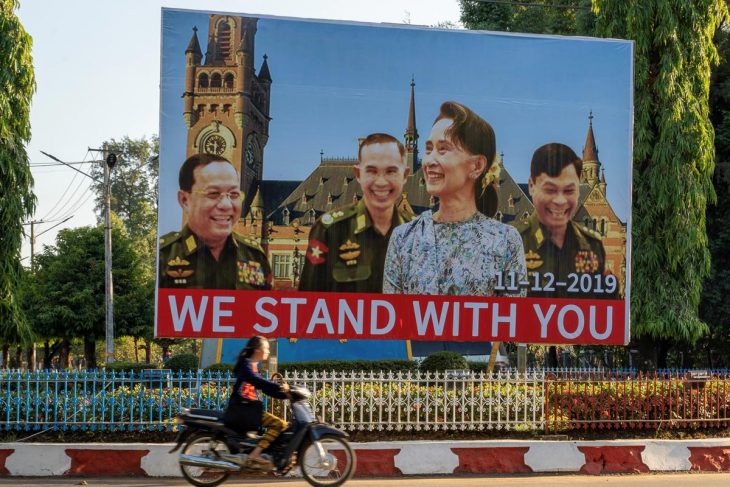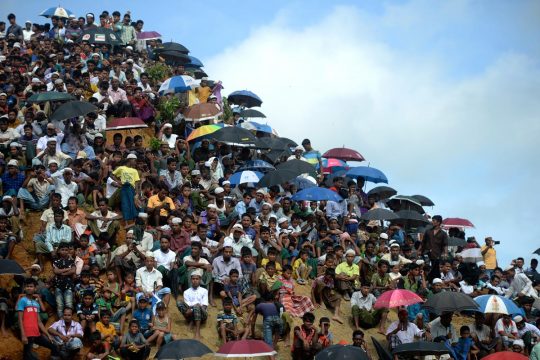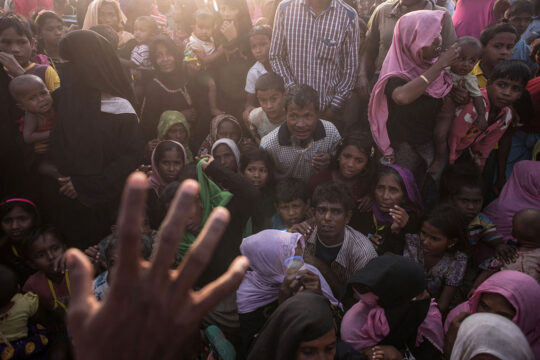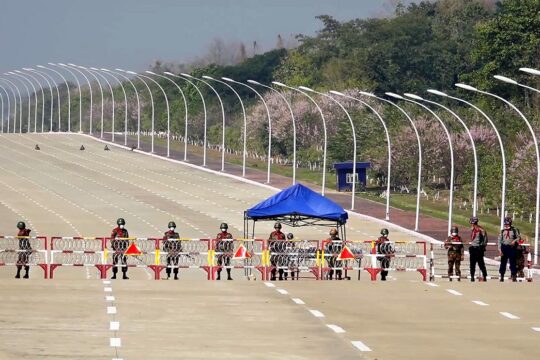This week the case will commence at the International Court of Justice (ICJ) before the glare of the world’s media, drawn not only by the significance of the case itself, but in particular by the direct role Aung Sang Suu Kyi is set to play in the defence of her government. On 11 November, The Gambia instituted proceedings against Myanmar at the ICJ, based in The Hague. The Gambia’s application alleges that the Government of Myanmar’s treatment of the Rohingya constitutes a manifest violation of the 1948 Convention on the Prevention and Punishment of the Crime of Genocide.
The persecution of the Rohingya has been ongoing for decades; their status as the ‘other’ has been a convenient outlet for the oppressive, violent and, all too often, deadly impulses of Buddhist nationalism stretching back to well before the independence of the state in 1948. For too long, the international community’s acknowledgment of the plight of the Rohingya has been ephemeral and largely absent from discussions on Myanmar’s ‘transition’ to democracy, as well as its return to the global fold. In 2016 and 2017, the mass exodus of well-over 750,000 Rohingya from North Rakhine State across the border into neighboring Bangladesh forced the issue on to the global agenda. The systematic nature of the violence carried out at the hands of the Myanmar military and security forces that precipitated the ongoing cycle of exodus is by now well-documented. Under the guise of so-called counter-terrorism ‘clearance operations’, agents of the state have engaged in acts of mass murder, rape and sexual violence, torture, and wanton destruction of Rohingya towns and villages in the Rakhine State.
The response of the international community has been characterized more by the rhetoric of condemnation rather than meaningful and robust action. In 2017, under the auspices of the Human Rights Council, the United Nations established the Independent International Fact-Finding Mission on Myanmar (IIFFMM) to document and collect evidence of crimes that may be relevant in the context of future prosecutions of individual perpetrators before domestic courts, or an internationally mandated court or tribunal.
Significance of the ‘crime of crimes’ label
The FFM Report of September 2018 expressly indicated that there are prima facie grounds to believe that the acts committed by the Myanmar military and security forces constitute the crime of genocide, a finding it reiterated in its Report of September 2019. These findings echo the comments of the UN Special Rapporteur on the Situation of Human Rights in Myanmar, Yanghee Lee, who referred to the situation as “bearing the hallmarks of genocide”. Similarly, the UN Special Advisor on the Prevention of Genocide, Adama Dieng, stated that the facts of the situation, “if proven, would constitute the crime of genocide”.
As the UN General Assembly stated in its first session in December 1946, “[g]enocide is a denial of the right of existence of entire human groups, as homicide is the denial of the right to live of individual human beings”. Although it is often used rhetorically as a synonym for any instance of mass murder, under the 1948 Genocide Convention only acts committed against a national, ethnic, racial, or religious group, with the specific intent to destroy that group in whole or in part, qualify as the crime of genocide. The Convention makes clear that genocide is not restricted to instances of mass killing; it also encompasses acts causing serious bodily or mental harm to members of the group, measures intended to prevent births within the group, and the deliberate infliction of conditions of life calculated to bring about the physical destruction of the group in whole or in part.
To say that Myanmar committed the crime of genocide against the Rohingya, is to say that its actions were carried out with the intent to eradicate them as a group in whole or in part. It is not enough to show that they intended to remove them from their homes or drive them across the border into Bangladesh; it must be proven that the intent was to destroy them.
Given the strict parameters of its definition and the evidential burden of establishing the specific intent to destroy a group, UN bodies, international courts and tribunals, and international legal practitioners generally, are not likely to flippantly label a situation as amounting to genocide. However, the argument that the crimes committed against the Rohingya amount to genocide is unavoidably compelling. Indeed, it is not unreasonable to suggest that the situation of the Rohingya constitutes one of the most obviously provable instances of genocide since the Rwandan or Srebrenica genocides of the 1990s.
Unprecedented legal altruism
Since the rights under the Convention are of general interest to all states, The Gambia, as a party to the Convention along with Myanmar, has the right under Article IX of the Convention to sue Myanmar before the ICJ to litigate its wrongdoing and responsibility under international law. The invocation of erga omnes obligations before the ICJ is extremely rare; indeed, The Gambia’s claim is unique and unprecedented under the Genocide Convention. The only two previous cases at the ICJ relating to genocide were taken by neighbouring states in the Balkans who were alleging that their own citizens had been direct victims.
While The Gambia is supported in taking the action by 57 states of the Organization of Islamic Cooperation, it is very much taking the lead. In calling out Myanmar in The Hague, it is engaging in an act of legal altruism. It has nothing to materially gain from the proceedings, indeed it will incur significant financial costs in taking the case; rather, it is intervening in the interests of arguably the most vulnerable group on the planet because it feels it must if their rights are to be vindicated and their destruction is to be halted.
“The lady doth protest too much”
Whereas The Gambia have nothing to gain from the case, Suu Kyi has everything to lose. While she once stood as a beacon of dignity and universal human rights, her refusal to acknowledge the crimes committed against the Rohingya, and her denial of their very existence as a group with historical roots in Myanmar, have condemned her to the status of a pariah. Her submissions to the Court this week, actively defending the actions of her state, may make this status irreversible.
Her participation will draw the attention of the world’s media to the Peace Palace, the historic building in The Hague that houses the ICJ. Rallies have been held in support of her throughout Myanmar as she sets out to defend her nation and its generals. In terms of her possible motivation, with elections pending in 2020, her party, the National League for Democracy is faltering in the polls, having failed to deliver on promises to reform the highly contentious 2008 Constitution. Perhaps she is banking on gaining much needed domestic political capital by assuming such a prominent role in the case. The decision to do so comes straight out of the populist playbook and may prove quite effective.
Paths to accountability for the Rohingya
It is worth noting, however, that this set of hearings do not relate to the merits of The Gambia’s claim; this will happen at a later stage and will take several years to conclude. Instead, it relates to The Gambia’s request for provisional measures against Myanmar. Provisional measures are analogous with the issuance of an injunction in domestic legal proceedings. Essentially, The Gambia is requesting that the Court order Myanmar to cease all actions that amount to or contribute to the commission of genocide, to actively prevent them from occurring in the future, and to refrain from the destruction of evidence relevant to the case. The order, if granted, will be a form of interim relief binding on Myanmar, and would be an early victory for The Gambia and the Rohingya.
The avenues for accountability for the crimes against the Rohingya are limited. While the office of the prosecutor of the International Criminal Court recently opened a separate investigation into the situation of the Rohingya, this investigation is jurisdictionally limited to the crime against humanity of deportation and connected offences, and at this moment it is impossible to predict if or when a case might materialize. The same applies for efforts at domestic prosecutions, such as that initiated against Suu Kyi before a court in Buenos Aires (Argentina) under the principle of universal jurisdiction.
Both of those initiatives relate to individual criminal responsibility. No single person is or could be on trial at the ICJ, as it deals only with state responsibility for violations of obligations under international law. However, the political, moral and narrative significance of a finding that a state has committed the ‘crime of crimes’ would in many ways outweigh the issuance of an arrest warrant against an individual perpetrator. The initiative of The Gambia has offered the Rohingya at least a modicum of hope that accountability may be delivered, and that Myanmar’s reckoning may finally be underway.
 JOSEPH POWDERLY
JOSEPH POWDERLY
Dr. Joseph Powderly is Associate Professor of Public International Law at the Grotius Centre for International Legal Studies, Leiden University, where he lectures in international criminal law, international criminal litigation and public international law. He has been involved in research and advocacy into the Rohingya for over 10 years. Between September 2008 and January 2010, he was Researcher at the Irish Centre for Human Rights where he worked as co-investigator and author of an Irish Government-funded investigation and report into the possible perpetration of crimes against humanity against the Rohingya in North Rakhine State, Burma/Myanmar.






